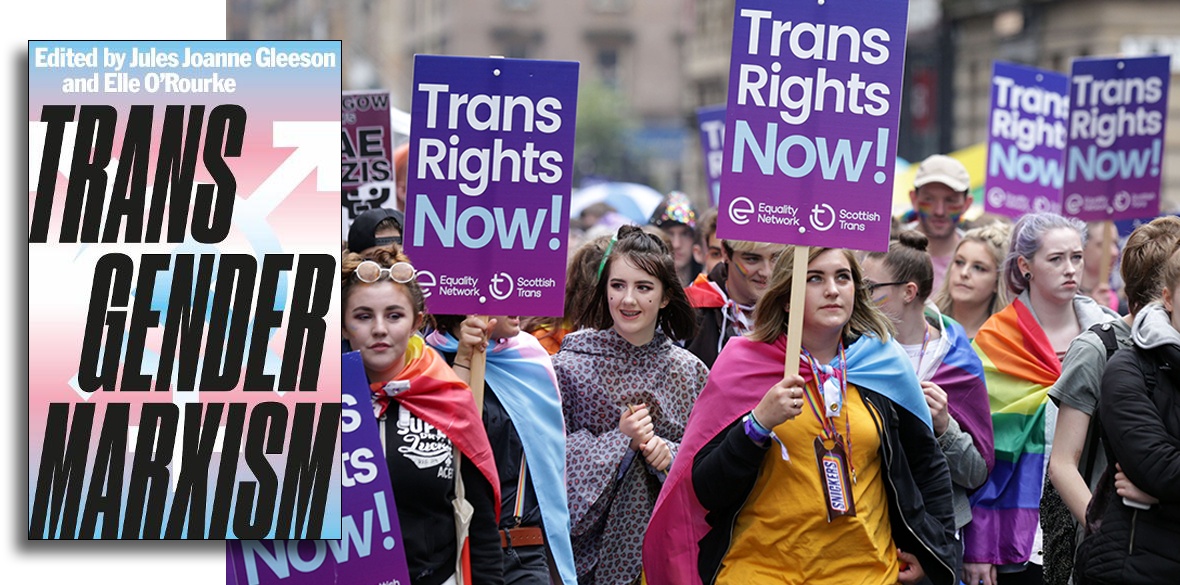This is the last article you can read this month
You can read more article this month
You can read more articles this month
Sorry your limit is up for this month
Reset on:
Please help support the Morning Star by subscribing here
Transgender Marxism
Edited by Jules Joanne Gleeson and Elle O’Rourke
(Pluto Press, £16.99)
BILLED as a watershed moment in transgender theory, this book seeks to explore the relationship between transgender identity and revolutionary politics.
Its editors, Jules Joanne Gleeson and Elle O’Rourke, begin by noting the extraordinary growth in numbers and visibility of trans people over the last decade or so and celebrate what they see as the growing popularity of transgender culture as it goes mainstream.
Yet in their introduction they quickly inform the reader that the aim of the collection is not to “birth a new perspective” or, extending the reproductive metaphor, to “bring into being a coupling of transgender theory and Marxist politics.”
Rather, the collected essays, mainly by writers based in the US and Britain, cover such topics as transgender identity development, union organising, the politics of disability and varieties of trans work including gaming and the tech industry, the retail sector and HIV services.
While the editors acknowledge the substantial legislative gains made by trans people in some parts of the world, they see formal legal equality and protection as insufficient in the bid for trans liberation. Indeed, the book, while by no means constituting a systematic analysis, clearly seeks to present trans people as a class in themselves — even a revolutionary one — in search of liberation.
Trans people are not, though, a homogenous group: they are divided along sex, race and class lines. The average working-class trans person has nothing in common with, for example, Jennifer Pritzker, the US billionaire and former lieutenant colonel of the Illinois National Guard.
While transgender people undoubtedly face discrimination it is not the case, as Mary Davis has convincingly argued in her book Women and Class, that they are an oppressed group in the way that women or black people are.
Unlike women, trans people per se are not oppressed on the basis of their biological and social role in reproductive labour or super-exploited as a result within capitalism.
And, unlike black people, whose oppression is based in their visible difference which subjects them to super-exploitation in the workplace, trans people are a racially and economically diverse group.
Although passing up the attempt to theorise anti-trans discrimination in relation to other forms of oppression, the book does gesture towards several Marxist-derived theories, including social reproduction theory and Marx’s idea of metabolic rift.
The latter is explored in the lengthy afterword by Jordy Rosenberg which does a lot of the theoretical heavy lifting for the rest of the book.
In contrast, a chapter by Rosa Lee on the work of Judith Butler as the basis for a “transsexual Marxism” argues that “not only gender but the sexed body itself is social rather than natural,” which apparently “opens up the possibility of collective transition to communism as a process of undoing, remaking, or even substantially abolishing gender.”
Queer theory, which represents the more or less explicit rejection of Marxism and is antithetical to class politics, is avoided by name in Jules Joanne Gleeson’s chapter on gender transitions.
It argues for two models of trans identity, based on individual negotiation of gendered norms and community-based reciprocal recognition. Gleeson largely sidesteps difficult questions of how claiming a gender identity relates to the material reality of sex, to ideological processes and to the (dis)unity of class struggle.
One might expect a book called Transgender Marxism to explore the connection between the emergence of the transgender umbrella as a significant sociological phenomenon and the rise of neoliberalism under capitalism; to examine the ways in which biomedical companies and Big Pharma are profiting from people’s unhappiness with gender stereotypes and roles and to analyse the class interests that underpin the promotion of gender identity as an ideology.
This book does none of those things. What it does do is to examine aspects of transgender experience — of self-identification, transition, community life and low-paid jobs and discrimination at work — which adds descriptive detail to a sociological understanding of trans lives and which some readers will no doubt find valuable.
But overall, the book misses the opportunity to answer the big questions of interest to Marxists. Anyone looking for a coherent theory of the relation between transgenderism and Marxism is likely to be disappointed.










